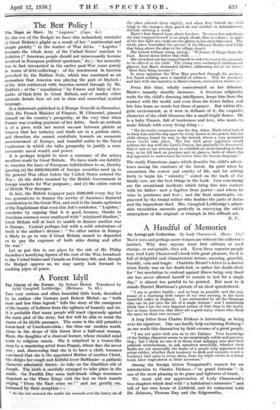The Best Policy !
The Dupe ae Hero. By " Logistes." (Cape. de.) ON the eve of the Budget we have this melancholy reminder of Great Britain's plight as a result of her " sentimental and simple probity " in the matter of War debts. " Logistes recounts the whole story of the United States' reaction to isolation (" American people should not unnecessarily become involved in European political questions," &c.)—her necessity was in fact interpreted in the earlier post-War years purely in terms of debt-collecting : of the resentment in America provoked by the Balfour Note, which was construed as an Accusation that America was playing the part of Shylock : of the debt settlement with America carried through by Mr. Baldwin : of the " repudiation " by France and Italy of five- sixths of their debt to Great Britain, and of sundry other intricate details here set out in clear and somewhat cynical language.
In a statement published in L'Europe Nouvelle in December, 1924, the French Minister of Finance, M. Clementel, plumed himself on- his country's prosperity, at the very time when France was evading payment of her debts. Such an attitude is of a piece with her recent see-saw between plaints at Geneva that her industry and trade are in a parlous state, and therefore she cannot contribute towards an economic assainissement of Europe, and boastful asides to the Naval Conference in which she talks prosperity to justify a com- mensurate naval wealth and power.
It is perhaps helpful to have a summary of the actual sacrifices made by Great Britain. We have made our liability to America the basis of European indebtedness to us, thereby ignoring (a) the £800,000,000 of foreign securities used up in the general •War effort before the United. States entered the War ; (b) the debts incurred by the British Government in foreign markets for War purposes ; and (c) the entire extent of British War damages.
In fact, the British taxpayer pays £100,000 every day for two generations to finance the service of America's financial contribution to the Great War, and such is the innate optimism of the Englishman that even this Job's comforter, " Logistes," concludes by arguing that it is good, because, thanks to American common sense unalloyed with " misplaced idealism," Great Britain will at least be unable to finance another war in Europe. Cynical perhaps, but with a solid substratum of truth is the author's dictum : " No other nation in Europe is likely to go to war if Great Britain cannot be depended on to pay the expenses of both sides during and after the war."
Let us put this in our pipes by the side of Mr. Philip Snowden's horrifying figures of the cost of the War, broadcast to the United States and Canada on February 9th, and, though the Budget oppress us, we may surely look forward to smoking pipes of peace.


























































 Previous page
Previous page